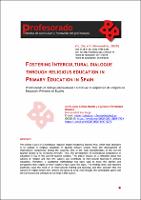Por favor, use este identificador para citar o enlazar este ítem:
https://repositorio.usj.es/handle/123456789/642
Registro completo de metadatos
| Campo DC | Valor | Lengua/Idioma |
|---|---|---|
| dc.contributor.author | Sierra Huedo, Mª Luisa | - |
| dc.contributor.author | Fernández-Romero, Cayetano | - |
| dc.date.accessioned | 2021-10-26T13:26:24Z | - |
| dc.date.available | 2021-10-26T13:26:24Z | - |
| dc.date.issued | 2020 | - |
| dc.identifier.citation | Sierra Huedo, M. L., y Fernández Romero, C. (2020). Fostering intercultural dialogue through religious education in primary education in Spain. Profesorado. Revista de Currículum y Formación de Profesorado, 24(3), 335-356. DOI: 10.30827/profesorado.v24i3.8170 | es_ES |
| dc.identifier.issn | 1138-414X | es_ES |
| dc.identifier.uri | https://repositorio.usj.es/handle/123456789/642 | - |
| dc.description | Este artículo forma parte de un proyecto de investigación con diferentes fases, financiado por Erasmus+, cuyo objetivo principal es analizar como la educación religiosa en colegios españoles de educación primaria ayuda a promover el desarrollo de la competencia intercultural entre sus estudiantes. Una de las características de la sociedad española actual es la incorporación de personas con diversidad cultural. Por este motivo, el desarrollo de la competencia intercultural en la educación es fundamental. En este trabajo, se plantea una reflexión sobre el cómo la materia de Religión puede contribuir a esta formación en educación primaria. Para ello se ha empleado una metodología cualitativa que permite conocer la opinión y valoración que sobre este tema tienen los docentes implicados. Los resultados indican que los profesores participantes valoran positivamente la necesidad de una formación intercultural y consideran que la materia de Religión facilita el contenido y espacio para hacerlo. Sin embargo, en su opinión, el currículo y horarios no lo facilita. | es_ES |
| dc.description.abstract | This article is part of a multiphase research project funded by Erasmus Plus, which main objective is to analyze if religious education in Spanish primary schools helps the development of intercultural competence among the students. One of the main characteristics of the current Spanish society is its increasing diversity. Thus, the development of intercultural competence in education is key in the current Spanish context. This article focuses on a reflection about the subject of religion and how this subject can contribute to intercultural learning in primary education. Therefore, a qualitative methodology has been used to know the opinion and perspective that religion primary teachers have about this topic. The findings show that teachers positively value the need of an intercultural training and learning, and they consider that the subject of religion fosters the content and space to do it. Even though, the participants agree that the curriculum and schedule do not help in this matter. | es_ES |
| dc.format.extent | 21 | es_ES |
| dc.format.mimetype | application/pdf | es_ES |
| dc.language.iso | eng | es_ES |
| dc.publisher | Universidad de Granada | es_ES |
| dc.relation.requires | Adobe | es_ES |
| dc.subject | Education | es_ES |
| dc.subject | Integration | es_ES |
| dc.subject | Intercultural competence | es_ES |
| dc.subject | Interculturalism | es_ES |
| dc.subject | Primary education | es_ES |
| dc.subject | Religious | es_ES |
| dc.subject | Spain | es_ES |
| dc.subject | Competencia intercultural | es_ES |
| dc.subject | Educación primaria | es_ES |
| dc.subject | Educación religiosa | es_ES |
| dc.subject | España | es_ES |
| dc.subject | Interculturalidad | es_ES |
| dc.subject | Integración | es_ES |
| dc.title | Fostering intercultural dialogue through religious education in Primary Education in Spain | es_ES |
| dc.title.alternative | Promoviendo el diálogo intercultural a través de la asignatura de religión en Educación Primaria en España | es_ES |
| dc.type | info:eu-repo/semantics/article | es_ES |
| dc.relation.publisherversion | https://digibug.ugr.es/handle/10481/64785 | es_ES |
| dc.identifier.publicationfirstpage | 335 | es_ES |
| dc.identifier.publicationlastpage | 355 | es_ES |
| dc.identifier.doi | 10.30827/PROFESORADO.V24I3.8170 | es_ES |
| dc.rights.accessrights | info:eu-repo/semantics/openAccess | es_ES |
| Aparece en las colecciones: | Artículos de revistas | |
Ficheros en este ítem:
Los ítems de USJ están protegidos por copyright, con todos los derechos reservados, a menos que se indique lo contrario.

